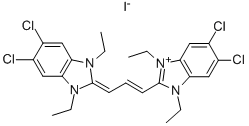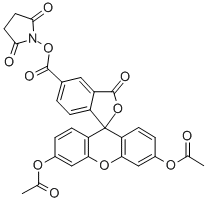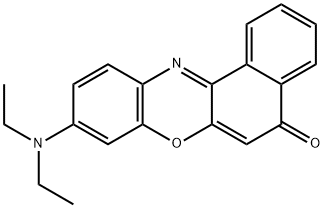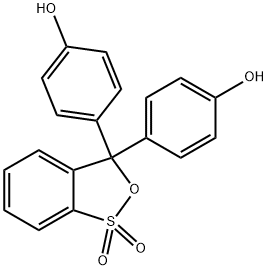JC-1
Synonym(s):5,5′,6,6′-Tetrachloro-1,1′,3,3′-tetraethylbenzimidazolocarbocyanine iodide;5,5′,6,6′-Tetrachloro-1,1′,3,3′-tetraethyl-imidacarbocyanine iodide;CBIC2(3)
- CAS NO.:3520-43-2
- Empirical Formula: C25H27Cl4N4.I
- Molecular Weight: 652.228
- MDL number: MFCD00188475
- EINECS: 200-258-5
- SAFETY DATA SHEET (SDS)
- Update Date: 2024-11-13 11:39:26

What is JC-1?
Description
JC-
The Uses of JC-1
A dual-emission potential-sensitive probe that can be used to measure mitochondrial membrane potential. JC-1 is a green-fluorescent monomer at low membrane potential. At higher potentials, JC-1 forms red-fluorescent "J-aggregates," which exhibit broad exc
The Uses of JC-1
The cyanine dye JC-1 has been used to determine mitochondrial transmembrane potential.
What are the applications of Application
JC-1 iodide is a mitochondrial membrane potential dye and fluorescent probe used to test Pgp activity.
Definition
ChEBI: 1,1',3,3'-tetraethyl-5,5',6,6'-tetrachloroimidacarbocyanine iodide is a cyanine dye and an organic iodide salt. It has a role as a fluorochrome. It contains a 1,1',3,3'-tetraethyl-5,5',6,6'-tetrachloroimidacarbocyanine.
References
1) Reers et al. (1991), J-aggregate formation of a carbocyanine as a quantitative fluorescent indicator of membrane potential; Biochemistry, 30 4480 2) Smiley et al. (1991), Intracellular heterogeneity in mitochondrial membrane potentials revealed by a J-aggregate-forming lipophilic cation JC-1; Proc. Natl. Acad. Sci. USA, 88 3671 3) Lisa et al. (1995), Mitochondrial membrane potential in single living adult rat cardiac myocytes exposed to anoxia or metabolic inhibition; J. Physiol., 486 1 4) Wolosin et al. (2017), Application of JC1 for non-toxic isolation of cells with MDR transporter activity by flow cytometry; PLoS One, 12(4) e0174905 5) Wang et al. (2017), A novel cytoprotective peptide protects mesenchymal stem cells against mitochondrial dysfunction and apoptosis induced by starvation via Nrf2/Sirt3/FoxO3a pathway; J. Transl. Med., 15 33
Properties of JC-1
| Melting point: | 275–278 ℃ |
| storage temp. | room temp |
| solubility | Soluble in methanol, N,N-dimethyl formamide, dimethyl sulfoxide |
| form | crystals |
| color | Deep red |
| λmax | 514nm |
| Stability: | Store as supplied desiccated at -20°C for up to 2 years from the date of purchase. Solutions in DMSO or distilled water may be stored at 4°C for up to 1 year. DO NOT FREEZE/THAW SOLUTIONS. Sterilize solutions only by filtration, not by autoclaving |
| Biological Applications | Detectingmitochondrialmembrane potential,ABCB1,ABCC1,and ABCG2 transporters inhibitors,nucleic acid hybridization,prostate cancer; treating cellular death,Alzheimer’s disease; apoptosis assay; cytotoxicity assay; hematotoxicity |
| Major Application | Langmuir-Blodgett films;
lasing systems; nonlinear optical materials;
photographic materials1, |
Safety information for JC-1
Computed Descriptors for JC-1
| InChIKey | FYNNIUVBDKICAX-UHFFFAOYSA-M |
New Products
4-Fluorophenylacetic acid 4-Methylphenylacetic acid N-Boc-D-alaninol N-BOC-D/L-ALANINOL Tert-butyl bis(2-chloroethyl)carbamate 3-Morpholino-1-(4-nitrophenyl)-5,6-dihydropyridin- 2(1H)-one Furan-2,5-Dicarboxylic Acid Tropic acid S-2-CHLORO PROPIONIC ACID ETHYL ISOCYANOACETATE 2-Bromo-1,3-Bis(Dimethylamino)Trimethinium Hexafluorophosphate (6-METHYL-[1,3]DITHIOLO[4,5-b]QUINOXALIN-2-ONE INDAZOLE-3-CARBOXYLIC ACID 4-IODO BENZOIC ACID (2-Hydroxyphenyl)acetonitrile 4-Bromopyrazole 5,6-Dimethoxyindanone 2-(Cyanocyclohexyl)acetic acid 4-methoxy-3,5-dinitropyridine 2-aminopropyl benzoate hydrochloride 1-(4-(aminomethyl)benzyl)urea hydrochloride diethyl 2-(2-((tertbutoxycarbonyl)amino) ethyl)malonate tert-butyl 4- (ureidomethyl)benzylcarbamate Ethyl-2-chloro((4-methoxyphenyl)hydrazono)acetateRelated products of tetrahydrofuran








You may like
-
 JC-1 CAS 3520-43-2View Details
JC-1 CAS 3520-43-2View Details
3520-43-2 -
 2033-24-1 98%View Details
2033-24-1 98%View Details
2033-24-1 -
 1975-50-4 98%View Details
1975-50-4 98%View Details
1975-50-4 -
 2-HYDROXY BENZYL ALCOHOL 98%View Details
2-HYDROXY BENZYL ALCOHOL 98%View Details
90-01-7 -
 2-Chloro-1,3-Bis(Dimethylamino)Trimethinium Hexafluorophosphate 221615-75-4 98%View Details
2-Chloro-1,3-Bis(Dimethylamino)Trimethinium Hexafluorophosphate 221615-75-4 98%View Details
221615-75-4 -
 61397-56-6 CIS BROMO BENZOATE 98%View Details
61397-56-6 CIS BROMO BENZOATE 98%View Details
61397-56-6 -
 14714-50-2 (2-Hydroxyphenyl)acetonitrile 98+View Details
14714-50-2 (2-Hydroxyphenyl)acetonitrile 98+View Details
14714-50-2 -
 118753-70-1 98+View Details
118753-70-1 98+View Details
118753-70-1